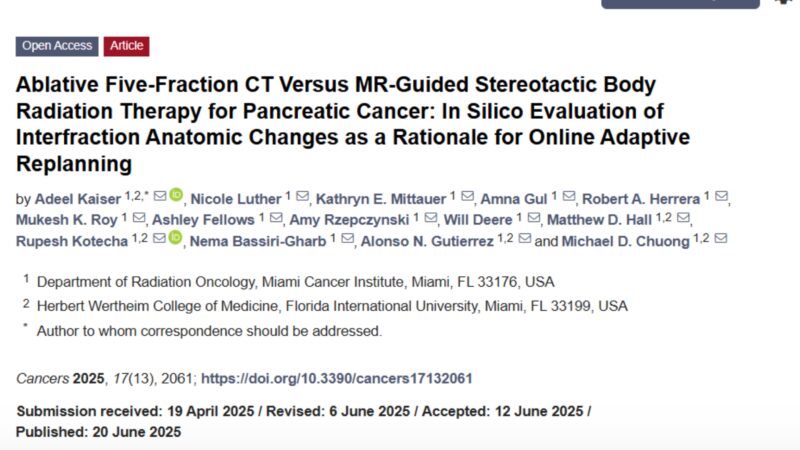Michael Chuong, Vice Chair and Medical Director of the Department of Radiation Oncology at Miami Cancer Institute, shared a post on LinkedIn:
“Online adaptive radiotherapy (oART) is increasingly being used to deliver high ablative dose for inoperable pancreatic cancer that may improve patient survival.
However, the benefits of oART vs. standard non-adaptive RT have not previously been reported. Such data could be beneficial to guide treatment decisions, especially since oART is a technically complex and resource intensive procedure that is currently offered at a limited number of institutions.
-
This is the first in silico comparison of 5-fraction ablative pancreatic SBRT delivered w/ online adapted MR-guided vs. non-adapted CT-guided radiotherapy
-
120 total treatment plans were compared
-
Tumor coverage by an ablative dose was high in both cohorts
-
96% of all plans violated stomach/bowel constraints w/o oART
-
100% of all plans met stomach/bowel constraints w/ oART
-
These data support the importance of oART in enhancing safety when delivering ablative 5-fraction SBRT, which ideally should be delivered at a high-volume center.”
Title: Ablative Five-Fraction CT Versus MR-Guided Stereotactic Body Radiation Therapy for Pancreatic Cancer: In Silico Evaluation of Interfraction Anatomic Changes as a Rationale for Online Adaptive Replanning
Authors: Adeel Kaiser, Nicole Luther, Kathryn E. Mittauer, Amna Gul, Robert A. Herrera, Mukesh K. Roy, Ashley Fellows, Amy Rzepczynski, Will Deere, Matthew D. Hall, Rupesh Kotecha, Nema Bassiri-Gharb, Alonso N. Gutierrez, Michael D. Chuong
Read the Full Article.

More posts featuring Michael Chuong on OncoDaily.
